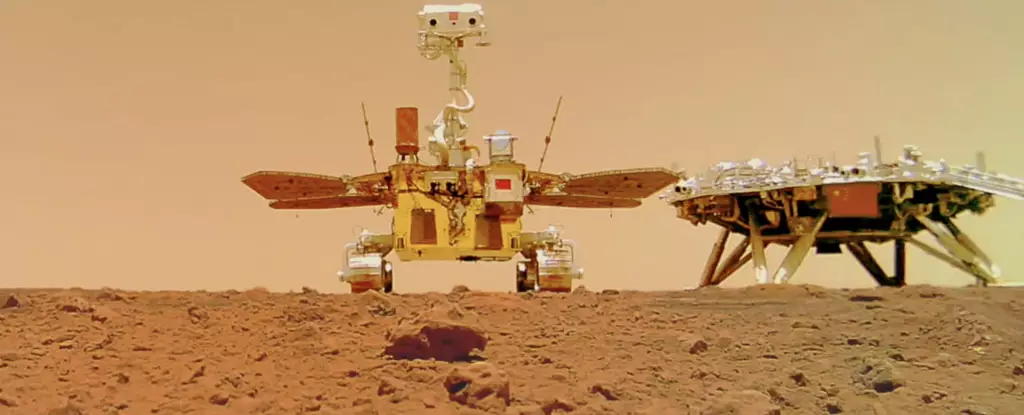Recent findings from China’s Zhurong rover have reignited discussions surrounding the theory that Mars may have once housed a vast ocean. A study published in the journal *Scientific Reports* presents evidence suggesting the presence of ancient shorelines in the Utopia region—marking a pivotal point in our understanding of Martian geology and history. While the notion of an ocean covering a significant portion of the Red Planet has long been predicated on various pieces of evidence, this latest study supports this idea with new observations made by the rover since its touchdown in 2021.
Lead researcher Bo Wu, affiliated with The Hong Kong Polytechnic University, indicated that the rover has detected numerous geological features around its landing site which resemble characteristics expected from a previous oceanographic environment. The peculiar formations identified include “pitted cones, polygonal troughs, and etched flows,” which suggest past interactions with liquid water. Such formations often signal the historical presence of mud volcanoes or other processes that typically arise in aqueous surroundings, thereby hinting at a rich, wetter Martian past.
The study proposed a timeline indicating that an ocean on Mars might have formed as a result of flooding approximately 3.7 billion years ago. Subsequently, this ocean would have undergone freeze-related processes, sculpting out a distinctive coastline, only to recede over 3.4 billion years ago. Therefore, the findings suggest dynamic changes on Mars that signal both the presence and the eventual retreat of water—a derivative of the planet’s climatic and geological evolution.
While the implications of these findings are enormous, Wu’s team remains cautious, noting that they do not claim definitive proof of an ocean’s existence. Rather, they acknowledge the scientific prudence of awaiting further missions that could retrieve Martian rock samples for more precise analysis. This reticence underscores the complex nature of planetary science, where new data is invaluable for refining existing hypotheses but must still be interpreted within broader geological contexts.
Despite the intriguing evidence, skepticism lingers within the scientific community. Benjamin Cardenas, a renowned planetary scientist, expressed doubt concerning the study’s conclusions. He argued that the researchers might have underestimated the erosive influence of Martian winds on sediment over billions of years. His comments highlight the nuances of contemporary planetary geology; while Mars may seemingly resemble the Moon’s tranquility, it is important to recognize that Mars has experienced its share of geological dynamism.
Cardenas pointed out that previous models predict even minor erosive forces over vast time scales would significantly obscure clear markers of shorelines, leaving room for skepticism regarding the newly proposed coastline. Bo Wu, while affirming the erosive forces at play, including the impact of meteoroids, offered that these factors might alternatively expose subsurface geological layers that could offer further insights.
Beyond its immediate implications for Martian history, the quest to confirm the existence of an ancient ocean carries profound significance for astrobiology. If Mars once teemed with liquid water, it parallels conditions that may have been conducive to life’s emergence. As Cardenas remarked, the origin of life on Earth is often theorized to stem from oceanic environments or tide pools—places where chemical processes could lead to the building blocks of life.
Thus, understanding Mars’s past can potentially inform questions about life’s existence elsewhere in the Solar System. If we discover that Mars was indeed once capable of supporting life, it will bolster arguments that Earth is not unique in its capacity to host biological organisms. This search for life beyond our planet shared by all scientific endeavors ultimately aims to decode a cosmic mystery: Are we alone?
The revelations gleaned from Zhurong’s explorations reflect humanity’s enduring curiosity about Mars. The evidence, while supporting the notion of an ancient ocean, underscores that our journey along this path of discovery remains fraught with complexities, requiring both skepticism and open-minded inquiry as we seek answers to some of our most profound questions.


Leave a Reply